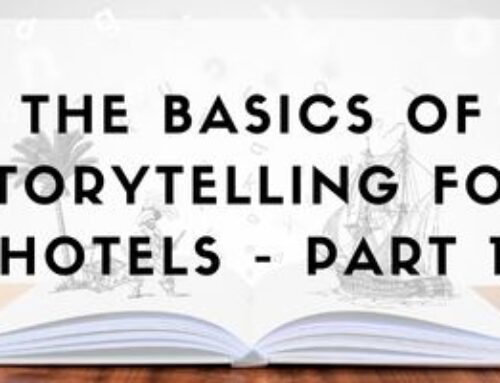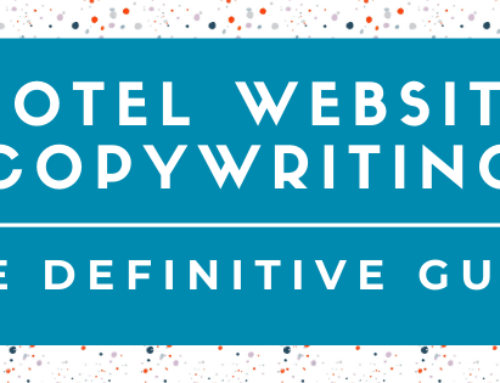
If you’ve spent any time researching hotel marketing, you’ve probably come across the term ‘shaping the narrative for your hotel.’
Maybe you were left wondering what that means and why a narrative is important for your property.
In short, your narrative is an important part of storytelling. And when used correctly, these two elements are powerful tools that can drive direct bookings for your hotel.
But why does your narrative play such a big role?
And who are you actually addressing with it?
That’s what we’re covering in this article, the second part of the three-part series on storytelling for hotels.
Let’s dive in!
(Missed part one? Check it out to learn about the basics of storytelling for hotels.)
Why the narrative for your hotel is crucial for good storytelling
Storytelling needs a coherent narrative to build a connection between your customers and your brand. It adds soul to your message and increases your offering’s perceived value. Ultimately, it’s what sticks in people’s minds and makes them remember your brand.
Science backs this up: studies show that people recall stories 22 times better than facts and figures.
Here’s why:
-
- Stories stimulate several senses and engage more areas of our brain than facts
- You build a connection and allow your audience to identify with you if the narrative for your hotel addresses their pain points or desires
- Stories with a strong narrative evoke emotions such as excitement for an upcoming trip or desire for an experience you offer
In short, a powerful narrative stays in people’s minds. It helps your hotel stand out while people are researching their next trip. And once they’re ready to book, they’ll think of you first.
But that’s not the only reason it’s important for your hotel. Storytelling and the right narrative also attract the right people in the first place. People who are much more likely to book with you because they want exactly what you offer, i.e., your ideal guest.
What’s the secret to drawing in potential guests, and getting them to book?
Get access to my free video training now, if you want to…
… learn how to leverage the power of storytelling and personal branding at your hotel to drive more direct bookings and keep more of your revenue!
By entering your details, you get access to sporadic newsletter-style emails about all things hospitality copywriting, including products and services I think you might like. You can unsubscribe anytime. I will protect your information in accordance with my privacy policy.
Addressing the right target – Know who you’re talking to
Knowing your target market is important when you’re developing your narrative. After all, you have to know who you’re writing to and what resonates most with them. If you read the first article in this three-part series, you’ll know that your ideal guest is both your reader and your main character.
But who is your ideal guest? What are they like?
You probably already have a good idea. After all, they’ve been coming to your hotel for years.
But even with Covid finally in the rearview mirror, some travel and demand patterns still aren’t what they were.
Instead of waiting passively for things to go back to “normal”, adapt the narrative for your hotel to the current situation – at least for now.
Yes, that takes effort. But it’s the only way to engage your audience and drive those valuable direct bookings.

Form a consistent brand voice
Knowing who you’re talking to and what they’re interested in, is the foundation for a strong narrative. Give it even more substance by leveraging a unique brand voice that conveys your hotel’s style and personality.
This voice should be consistent across all your channels, including your hotel website, social media and other communications. If it’s not, your brand won’t resonate well with your potential guests. In the worst case, that can lead people to bounce from your website and abandon bookings.
If your brand voice is clear, it will set the mood and show your potential guests if your style matches theirs. Remember, you don’t need to appeal to everyone, just your target audience.
Let’s go over the aspects your brand voice encompasses:
- Tone and style: your overall tone can be formal, familiar, friendly… whatever works for your target audience. Pick one and stick with it.
- Word choice: do you use terms and phrases that are specific to a certain group of people? Or do you have words and phrases you want to avoid?
- Addressing your guest: it’s always best to address your guest directly in your copy. That means writing in the second person (using you, your and you are…).

Now you know more about the important role your narrative and brand voice play as a foundation for your storytelling.
If you can get them to line up with your target audience’s interests and needs, you’ll be able to craft an engaging storyline for your hotel with ease.
And before you know it, your ideal guest will eagerly pull out their credit card to book with you.
If you’re still wondering where to find the best stories your hotel has to offer, head over to part three of the series.
What’s the secret to drawing in potential guests, and getting them to book?
Get access to my free video training now, if you want to…
… learn how to leverage the power of storytelling and personal branding at your hotel to drive more direct bookings and keep more of your revenue!
By entering your details, you get access to sporadic newsletter-style emails about all things hospitality copywriting, including products and services I think you might like. You can unsubscribe anytime. I will protect your information in accordance with my privacy policy.







Leave A Comment